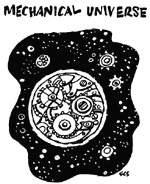
Aides
Metaphor
Comparing complexity science with traditional science
Complexity science addresses aspects of living systems
which are neglected or understated in traditional approaches. Existing models in
economics, management and physics were built on the foundation of Newtonian scientific
principles. The dominant metaphor in Newtonian science is the machine. The universe and
all its subsystems were seen as giant clocks or inanimate machines. The clocks or machines
can be explained using reductionism - by understanding each part separately. The whole of
the machine is the sum of the parts. The clockware perspective has led to great
discoveries by focusing on the attributes and functioning of the 'parts' - whether of a
human body or a human organization. The parts are controlled by a few immutable external
forces or laws. The parts are not seen to have choice or self determination. The
'machines' are simple and predictable - you need only understand the few guiding external
rules which determine how the parts will behave. There are limits to this perspective when
understanding living systems, and in particular human organizations. Clearly humans are
not machine parts without individual choice and so clockware is a necessary but not
sufficient way of understanding complex systems.
Principles
Clockware/
Swarmware

The Newtonian perspective assumes that all can be explained by the careful
examination of the parts. Yet that does not work for many aspects of human behavior. We
have all experienced situations in which the whole is not the sum of the parts - where we
cannot explain the outcomes of a situation by studying the individual elements. For
example, when a natural disaster strikes a community, we have seen spontaneous
organization where there is no obvious leader, controller or designer. In these contexts,
we find groups of people create outcomes and have impacts which are far greater than would
have been predicted by summing up the resources and skills available within the group. In
these cases, there is self-organization in which outcomes emerge which are highly
dependent on the relationships and context rather than merely the parts. Stuart Kauffman
calls this "order for free" and Kevin Kelly refers to it as "creating
something out of nothing."
Tales
Learn as you go
Bibliography
Kauffman:
At Home
Kelly:
Out of Control
"I found a lot of what we did [in management] was really dumb.
It was very impersonal. We treated people as if they were on-dimensional. If you figure
them out, give them strict rules, put money in front of them, they will perform
better...it was very linear." |
Complexity science is not a single theory. It is the study of complex adaptive systems - the patterns of relationships within them, how they are sustained, how they self-organize and how outcomes emerge. Within the science there are many theories and concepts. The science encompasses more than one theoretical framework. Complexity science is highly interdisciplinary including biologists, anthropologists, economists, sociologists, management theorists and many others in a quest to answer some fundamental questions about living, adaptable, changeable systems.
Next
| Previous | Return to Contents
List
All Components of Edgeware Primer Copyright © 2000, Brenda J. Zimmerman.
Schulich School of Business, York University, Toronto, Canada.
Permission to copy for educational purposes only. All other rights reserved.